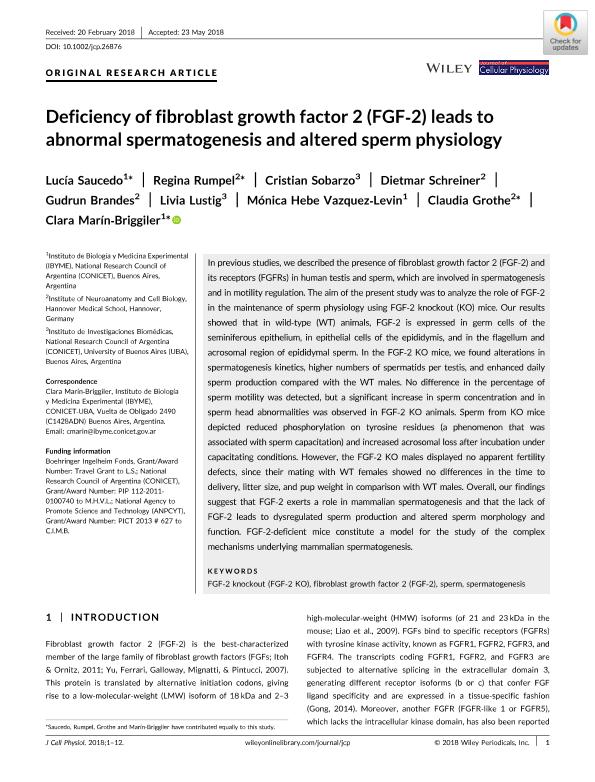Artículo
Deficiency of fibroblast growth factor 2 (FGF-2) leads to abnormal spermatogenesis and altered sperm physiology
Saucedo, Lucia ; Rumpel, Regina; Sobarzo, Cristian Marcelo; Schreiner, Dietmar; Brandes, Gudrun; Lustig, Livia
; Rumpel, Regina; Sobarzo, Cristian Marcelo; Schreiner, Dietmar; Brandes, Gudrun; Lustig, Livia ; Vazquez, Monica Hebe
; Vazquez, Monica Hebe ; Grothe, Claudia; Marin Briggiler, Clara Isabel
; Grothe, Claudia; Marin Briggiler, Clara Isabel
 ; Rumpel, Regina; Sobarzo, Cristian Marcelo; Schreiner, Dietmar; Brandes, Gudrun; Lustig, Livia
; Rumpel, Regina; Sobarzo, Cristian Marcelo; Schreiner, Dietmar; Brandes, Gudrun; Lustig, Livia ; Vazquez, Monica Hebe
; Vazquez, Monica Hebe ; Grothe, Claudia; Marin Briggiler, Clara Isabel
; Grothe, Claudia; Marin Briggiler, Clara Isabel
Fecha de publicación:
12/2018
Editorial:
Wiley-liss, Div John Wiley & Sons Inc
Revista:
Journal of Cellular Physiology
ISSN:
0021-9541
Idioma:
Inglés
Tipo de recurso:
Artículo publicado
Clasificación temática:
Resumen
In previous studies, we described the presence of fibroblast growth factor 2 (FGF-2) and its receptors (FGFRs) in human testis and sperm, which are involved in spermatogenesis and in motility regulation. The aim of the present study was to analyze the role of FGF-2 in the maintenance of sperm physiology using FGF-2 knockout (KO) mice. Our results showed that in wild-type (WT) animals, FGF-2 is expressed in germ cells of the seminiferous epithelium, in epithelial cells of the epididymis, and in the flagellum and acrosomal region of epididymal sperm. In the FGF-2 KO mice, we found alterations in spermatogenesis kinetics, higher numbers of spermatids per testis, and enhanced daily sperm production compared with the WT males. No difference in the percentage of sperm motility was detected, but a significant increase in sperm concentration and in sperm head abnormalities was observed in FGF-2 KO animals. Sperm from KO mice depicted reduced phosphorylation on tyrosine residues (a phenomenon that was associated with sperm capacitation) and increased acrosomal loss after incubation under capacitating conditions. However, the FGF-2 KO males displayed no apparent fertility defects, since their mating with WT females showed no differences in the time to delivery, litter size, and pup weight in comparison with WT males. Overall, our findings suggest that FGF-2 exerts a role in mammalian spermatogenesis and that the lack of FGF-2 leads to dysregulated sperm production and altered sperm morphology and function. FGF-2-deficient mice constitute a model for the study of the complex mechanisms underlying mammalian spermatogenesis.
Archivos asociados
Licencia
Identificadores
Colecciones
Articulos(IBYME)
Articulos de INST.DE BIOLOGIA Y MEDICINA EXPERIMENTAL (I)
Articulos de INST.DE BIOLOGIA Y MEDICINA EXPERIMENTAL (I)
Citación
Saucedo, Lucia; Rumpel, Regina; Sobarzo, Cristian Marcelo; Schreiner, Dietmar; Brandes, Gudrun; et al.; Deficiency of fibroblast growth factor 2 (FGF-2) leads to abnormal spermatogenesis and altered sperm physiology; Wiley-liss, Div John Wiley & Sons Inc; Journal of Cellular Physiology; 233; 12; 12-2018; 9640-9651
Compartir
Altmétricas



